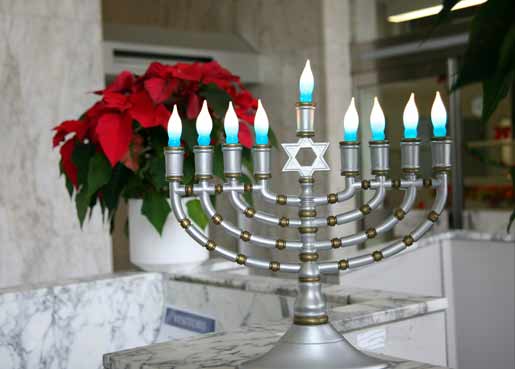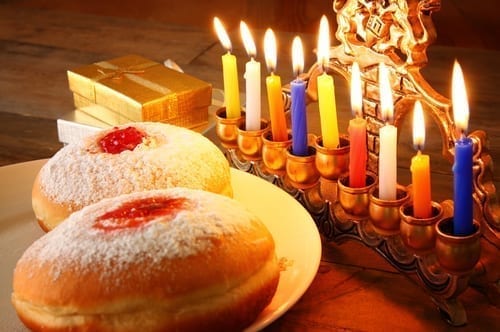More than two thousand one hundred and seventy years ago, the miracle of Chanukah took place, in which the Greeks who wanted to coerce us to abandon Torah and commandments were given into our hands by G-d. The Jews rested from their enemies and were able to encamp on the twenty-fifth of Kislev, when they purified the Temple and celebrated the “inauguration [chanukah] of the altar” by bringing thanksgiving and voluntary sacrifices to G-d, and resuming the divine service in the Temple.
The twenty-fifth day of Kislev was established for generations as a day of praise and thanksgiving to remember the miracle of Chanukah. But why have we been celebrating this miracle for generations? After all, if we would celebrate every miracle that G-d did for us, every day of the year would be a holiday and a festival. Who like the Jewish people are used to miracles, and our entire existence is above nature?!
However, our sages teach us that Chanukah was established for generations not only as a remembrance of a miracle, but because of its special essence. The war between the Greeks and Jews was not a conventional war. The Greeks did not want to kill the Jews, but only wanted them to embrace their culture. Jews who agreed to adopt Greek culture not only were not killed, but were even given special status by the Greeks, and some even received important positions. Greek culture at that time was a symbol of enlightenment and it was spreading throughout the world. The Greeks were bothered that one nation rejected their culture, and clung instead to its ancient culture. It ate away at them, at the very peak of their pride. So they attempted many ways to convert the Jews to their faith, and the existence of the Torah was, G-d forbid, for the first time in danger. What happened then?
A group of devout Jews, faithful to the Torah and its commandments, arose who were willing to risk their lives to fight the giant Greek empire. They knew in advance that logically, their chance to succeed were close to nil. Yet, their goal was not necessarily to win but to fight! Not to succumb to any attempt to blur our identity as Jews, but to continue to gloriously and proudly maintain the ancient Jewish heritage. And since their aim was holy, G-d assisted them and they succeeded. The outnumbered and weak defeated the many and powerful. It was a huge miracle! But then there was another miracle, as the Talmud tells us (Shabbat 21b):
“What is Chanukah? The Greeks entered the hall of the Temple and defiled all the oils. And when the Hasmoneans overpowered and defeated them, they wanted to light the Menorah, and checked and found only one cruse of oil that was sealed with the seal of the High Priest, which was sufficient to light for only one day. A miracle occurred and it lit for eight days. The following year they established it as a Yom Tov with the recital of Hallel and thanksgiving.”
If so, then two miracles occurred. The first — the miracle of the victory in the war of the many and the strong versus the weak and the few. And the second — the miracle of the oil.
Which miracle was greater? Of course, the miracle of the victory was greater, and it probably astonished the entire world and made it wonder: How can a handful of persecuted and weak Jews conquer the mighty Greek Empire?! But interestingly, the Talmud says that the festival of Chanukah was ordained precisely as a remembrance to the miracle of the cruse of oil, and not to the miracle of the victory. The menorah that we light each night of Chanukah also is to remind us of the miracle of the oil. Why?
The miracle of the cruse of oil is symbolic and has a lesson for future generations. in their attempt to uproot Judaism from the Jewish people, the Greeks defiled all the oil. They did not spill out the oil but defiled it. Let the oil remain, but it has to be impure. “The oil” (hashemen) has the same letters as “soul” (neshama). The Greeks wanted to defile the Jewish soul. They didn’t want to destroy the Jews like Titus and Haman and other murderous oppressors, but to defile us by implanting alien cultures and provocative ideas of heresy in us. Indeed, many Jews were misled and waylaid from the straight path, and enticed to follow the decadent Greek culture. The oils were defiled, and their worldview became corrupt.
However, the Hasmoneans’ uncompromising struggle led to finding a cruse of pure oil. The cruse of oil sealed with the seal of the High Priest is a symbol and a hint for all generations that G-d would always protect Israel from total foreign assimilation. The Jewish spark was never snuffed out through our hard and long exile during the thousands of years that the Jewish people lived in Babylon and in Spain, Germany and Poland, Morocco and Yemen. The Jewish people did not assimilate, despite all their tribulations.
These lessons are especially relevant to our generation where the situation of assimilation has probably never been worse! If the great Torah sages of previous generations would only see our generation, if Maimonides or Rashi, the Chafetz Chaim or the Ben Ish Chai would only see the unfortunate reality today that most of the Jewish people is captive in the hands of foreign cultures, and do not know what “Hear, O Israel” or what “Shabbat ” is — their grief would be immense.
But G-d will not abandon His people and will not forsake His inheritance. Even in a situation where all the oils were defiled, where many Jews’ worldview was corrupted, and where the pure souls of many Jewish people were contaminated — even then the cruse of pure oil, the Jewish point located deep in the heart of every Jew which can never be extinguished or contaminated, may still be found. If we only learn how to light it and make it shine, then it will rise and catch fire and be an eternal light and a holy flame.





